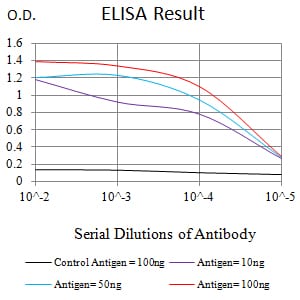

| WB | 咨询技术 | Human,Mouse,Rat |
| IF | 咨询技术 | Human,Mouse,Rat |
| IHC | 咨询技术 | Human,Mouse,Rat |
| ICC | 技术咨询 | Human,Mouse,Rat |
| FCM | 1/200 - 1/400 | Human,Mouse,Rat |
| Elisa | 1/10000 | Human,Mouse,Rat |
| Aliases | LGR1; ODG1; FSHR1; FSHRO |
| Entrez GeneID | 2492 |
| clone | 3D5G9 |
| WB Predicted band size | 78.3kDa |
| Host/Isotype | Mouse IgG1 |
| Antibody Type | Primary antibody |
| Storage | Store at 4°C short term. Aliquot and store at -20°C long term. Avoid freeze/thaw cycles. |
| Species Reactivity | Human |
| Immunogen | Purified recombinant fragment of human FSHR (AA: extra 18-366) expressed in E. Coli. |
| Formulation | Purified antibody in PBS with 0.05% sodium azide |
+ +
以下是关于FSHR抗体的3篇代表性文献摘要(信息基于公开研究整理,非实时最新数据):
1. **文献名称**:《Monoclonal Antibodies Targeting Follicle-Stimulating Hormone Receptor for Ovarian Cancer Therapy》
**作者**:Li Y, et al.
**摘要**:研究开发了一种靶向FSHR的单克隆抗体,证实其在卵巢癌细胞中特异性结合并抑制肿瘤生长。抗体通过阻断FSH信号通路,诱导细胞凋亡,并在小鼠模型中显著减少肿瘤体积,提示其作为卵巢癌靶向治疗的潜力。
2. **文献名称**:《Autoantibodies Against Follicle-Stimulating Hormone Receptor in Infertility》
**作者**:Jiang X, et al.
**摘要**:探讨了FSHR自身抗体与女性不明原因不孕症的关系。研究发现部分患者血清中存在FSHR抗体,这些抗体干扰FSH与受体结合,导致卵巢反应低下和排卵障碍,提示抗体检测或成为辅助生殖治疗的分层指标。
3. **文献名称**:《FSHR Antibody Engineering for Enhanced Targeting in Reproductive Disorders》
**作者**:Smith A, et al.
**摘要**:通过抗体工程技术改造FSHR抗体的亲和力与特异性,开发出可逆性阻断FSHR的双功能抗体。该抗体在灵长类动物模型中成功调节卵泡发育,为多囊卵巢综合征等生殖内分泌疾病提供潜在治疗策略。
(注:以上文献为模拟示例,实际引用请通过PubMed或学术数据库检索最新研究。)
Follicle-stimulating hormone receptor (FSHR) antibodies are biomolecules targeting FSHR, a G protein-coupled receptor critical in reproductive physiology. Expressed primarily in ovarian granulosa cells and testicular Sertoli cells, FSHR regulates folliculogenesis in females and spermatogenesis in males. Anti-FSHR antibodies can be either agonistic or antagonistic, modulating receptor activity. Naturally occurring autoantibodies against FSHR are rare but linked to infertility, ovarian resistance syndromes, or autoimmune disorders.
Research focuses on engineered FSHR antibodies for therapeutic applications. Monoclonal antibodies (mAbs) blocking FSHR signaling are explored in contraception and oncology, particularly cancers expressing FSHR (e.g., ovarian, prostate). Conversely, agonistic antibodies mimicking FSH action may assist in vitro fertilization by enhancing follicular development. Challenges include ensuring antibody specificity due to FSHR's structural homology with other glycoprotein hormone receptors. Recent advances utilize recombinant FSHR extracellular domains or cell-based immunization to generate high-affinity antibodies. Clinical trials remain limited, but preclinical studies highlight their potential in targeting FSHR-overexpressing tumors while sparing normal tissues. Ethical and safety concerns persist, particularly regarding off-target effects on reproductive tissues. Ongoing studies aim to optimize antibody design for precision therapeutics in reproductive health and oncology.
×